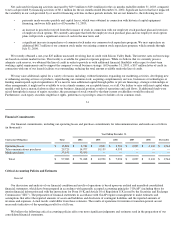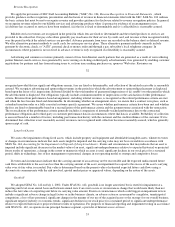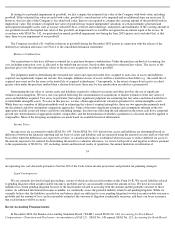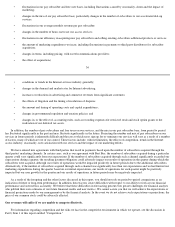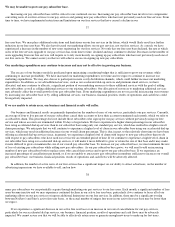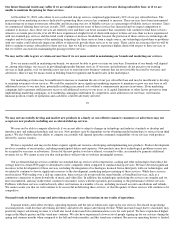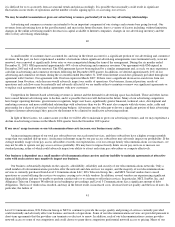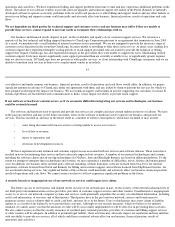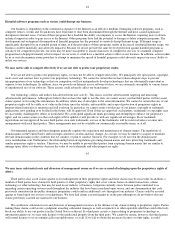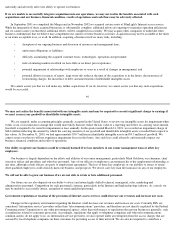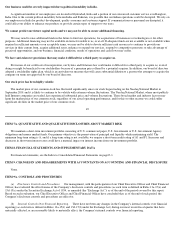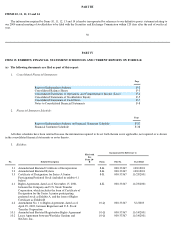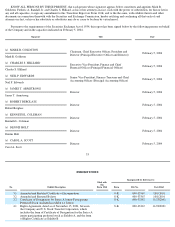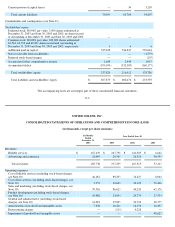Classmates.com 2003 Annual Report Download - page 35
Download and view the complete annual report
Please find page 35 of the 2003 Classmates.com annual report below. You can navigate through the pages in the report by either clicking on the pages listed below, or by using the keyword search tool below to find specific information within the annual report.
44
Harmful software programs such as viruses could disrupt our business.
Our business is dependent on the continued acceptance of the Internet as an effective medium. Damaging software programs, such as
computer viruses, worms and Trojan horses have from time to time been disseminated through the Internet and have caused significant
disruption to Internet users. Certain of these programs have disabled the ability of computers to access the Internet, requiring users to obtain
technical support in order to gain access to the Internet. Other programs have had the potential to damage or delete computer programs. The
development and widespread dissemination of harmful programs has the potential to seriously disrupt Internet usage. If Internet usage is
significantly disrupted for an extended period of time, or if the prevalence of these programs results in decreased residential Internet usage, our
business could be materially and adversely impacted. Because we do not provide the same level of protection against harmful programs as
certain of our competitors provide, our users may be more susceptible to attacks than users of competitive services. If a harmful computer
program had a disproportionately adverse impact on our users, it could have a material adverse effect on our business. In addition, actions taken
by us or our telecommunications providers to attempt to minimize the spread of harmful programs could adversely impact our users' ability to
utilize our services.
We may not be able to compete effectively if we are not able to protect our proprietary rights.
If we are not able to protect our proprietary rights, we may not be able to compete effectively. We principally rely upon patent, copyright,
trade secret and contract laws to protect our proprietary technology. We cannot be certain that we have taken adequate steps to prevent
misappropriation of our technology or that our competitors will not independently develop technologies that are substantially equivalent or
superior to our technologies. In addition, since we provide our Internet access software for free, we are extremely susceptible to various forms
of unauthorized use of our software. These actions could adversely affect our brand names.
Our technology collects and utilizes data derived from user activity. This data is used for advertisement targeting and measuring
advertisement performance. Although we believe that we have the right to use this data, we cannot assure you that third parties will not assert
claims against us for using this information. In addition, others may claim rights to the same information. We cannot be certain that any of our
proprietary rights will be viable or of value in the future since the validity, enforceability and scope of protection of proprietary rights in
Internet-related industries is uncertain and still evolving. In particular, we cannot assure you that any of our patent, copyright or trademark
applications, now pending or to be filed in the future, will be approved. Even if they are approved, such patents, trademarks or copyrights may
be successfully challenged by others or invalidated. We could spend significant funds procuring and attempting to enforce our proprietary
rights, and we cannot assure you that such rights will be upheld or will provide us with any significant advantages. If our trademark
registrations are not approved because third parties own such trademarks, our use of the trademarks will be restricted unless we enter into
arrangements with such third parties. These arrangements may not be available on commercially reasonable terms, or at all.
Governmental agencies and their designees generally regulate the acquisition and maintenance of domain names. The regulation of
domain names in the United States and in foreign countries is in flux and may change. As a result, we may be unable to acquire or maintain
relevant domain names in the countries that we conduct, or plan to conduct, business. For example, we do not own the domain name
www.unitedonline.com. Furthermore, the relationship between regulations governing domain names and laws protecting trademarks and
similar proprietary rights is unclear. Therefore, we may be unable to prevent third parties from acquiring domain names that are similar to,
infringe upon, dilute or otherwise decrease the value of our trademarks and other proprietary rights.
45
We may incur substantial costs and diversion of management resources if we are accused of infringing upon the proprietary rights of
others.
Third parties may assert claims against us for infringement of their proprietary rights and these claims may be successful. In addition, a
number of third parties have claimed to hold patents or other proprietary rights that cover various forms of online transactions, online
technology or other technology that may be used in our industry or business. Litigation currently exists between parties unrelated to us
regarding certain operating systems used throughout the industry that have been considered open source, and any determination that code
previously considered in the public domain is proprietary could result in additional costs throughout our industry. Claims could be asserted
against us based upon our services or technologies. We have had claims asserted against us in the past although we do not believe that any
claims previously asserted are material to our business.
We could incur substantial costs and diversion of management resources in the defense of any claims relating to proprietary rights. Parties
making these claims could secure a judgment awarding substantial damages as well as injunctive or other equitable relief that could effectively
block our ability to use our products in the United States or abroad. If a third party asserts a claim relating to proprietary technology or
information against us, we may seek licenses to the intellectual property from the third party. We cannot be certain, however, that third parties
will extend licenses to us on commercially reasonable terms, or at all. If we fail to obtain the necessary licenses or other rights, it could


